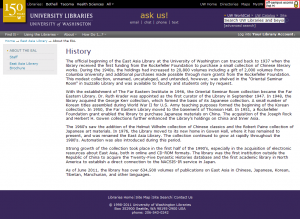I made this list on Wikipedia. It is awesome and in some form it is going to be read by millions of people and in its own small way it is going to have an impact on their lives.
This was for Wikipedia loves Libraries!, an initiative to get people more involved in their local libraries.
Here is the situation. Seattle, like any other city of this size and status, has libraries. There are the city libraries, like Seattle Public Library; the university libraries, like at the University of Washington; museum libraries, like most museums have a named library such as Seattle Art Museum’s McCaw Foundation Library; every research institute around here has a library, such as Fred Hutchinson Cancer Research Center’s Arnold Library; then there are city offices which have libraries, law firms with libraries, and private organizations who have libraries. I asked everyone in Seattle – many librarians at the city library, at various universities, at museums, at InfoCamp, and and the IR12 conference, “Who has a list of all the libraries? Who knows what kinds of materials all the libraries contain?” People mostly had no idea. Some people referred me to a reference called the American Library Directory.
The American Library Directory is a yearly updated listing of many libraries. They get contact information, addresses, names of librarians, a count of holdings, a year of founding, and then sometimes some description of a focus or specialization. This is really cool but it is not cool that it is not online, and that the book is extremely expensive and only held in a few places, and that small libraries are excluded without defined exclusion criteria. There ought to be a free, online, publicly moderated list of all libraries with a quick way to get detailed information about all of them.
This is why I made this list. Some version of this list ought to be made for every city in the world.
Here are some problems – neither the ALD or any other source typically publishes the history of libraries. Libraries are supposed to be a bastion of research but they seem not to expect that anyone would ever ask the most obvious questions about the library itself. I am posting one of the best-case scenarios in all the libraries I have checked in Seattle. The picture is a web capture of the East Asia Library at the University of Washington. The information is interesting and I am glad they posted it, but it is problematic. The first problem is authorship – who wrote this blurb? Was it a custodian of this collection? Just a regular staff librarian? Perhaps an internet-loving student intern? Maybe someone unaffiliated with the UW wrote this, and then the UW plagiarized it. Maybe the webmaster wrote it, or found this content online. Wherever it came from, I am sure no one remembers. There is no date on this information and there is no authorship. If the university published a book about itself I am sure they would remember to name an author and put a date of publication. How did it come to be that the keepers of information became so out of touch that they see no need to do this for information online? I know there are ways to reference websites, but the point that I want to make is that this is a low-quality source. And also there is no promise that this information will be retained; the university could revamp its website and then this link and this information would be gone from linkrot. With me as a researcher, it is disappointing to me when I cite someone and their link goes away. Especially when I have will to support an institution like a university library, I expect them to at least provide me the simplest materials possible to do the most obvious work, and they are not meeting my need.
Another problem is that libraries are not prepared to describe their holdings. The ALD makes some small descriptions of library holdings, like for example, I mentioned the Seattle Art Museum’s McCaw Foundation Library, and their entry in the ALD says they have media on “Asian art”. Most entries do not even say that much, and many libraries are named after a person and give no indication of their holdings. It is not appropriate for anyone to publish original thought or research on Wikipedia, because all information on Wikipedia is supposed to come from a published reference. This means that for some libraries very little information is available, so therefore little can be said about them on Wikipedia.In the case of the UW’s East Asia Library, this is how they describe their collection: “634,500 volumes of publications on East Asia in Chinese, Japanese, Korean, Tibetan, Manchurian, and other languages.” Other libraries also just describe their collections with a number and say that is their holdings, and they may also list a number of subscriptions. But that is hardly useful information, and it is almost moot considering that very soon all out-of-copyright texts are going to be available online. The information I really want is what kinds of holdings they have. In the case of the East Asia Library at UW – perhaps there is some theme to these books? Is a representative mix of the publications of those cultures, or do they have notable special collections? I asked a lot of librarians this. I am not sure that they understood me. In any case I got no answer of how to qualify the collections of libraries.
I am not sure what the solutions to these problems are.
